2022年牛津译林版英语中考一轮复习七年级下册Units7-8课件(共44张PPT)
文档属性
| 名称 | 2022年牛津译林版英语中考一轮复习七年级下册Units7-8课件(共44张PPT) | 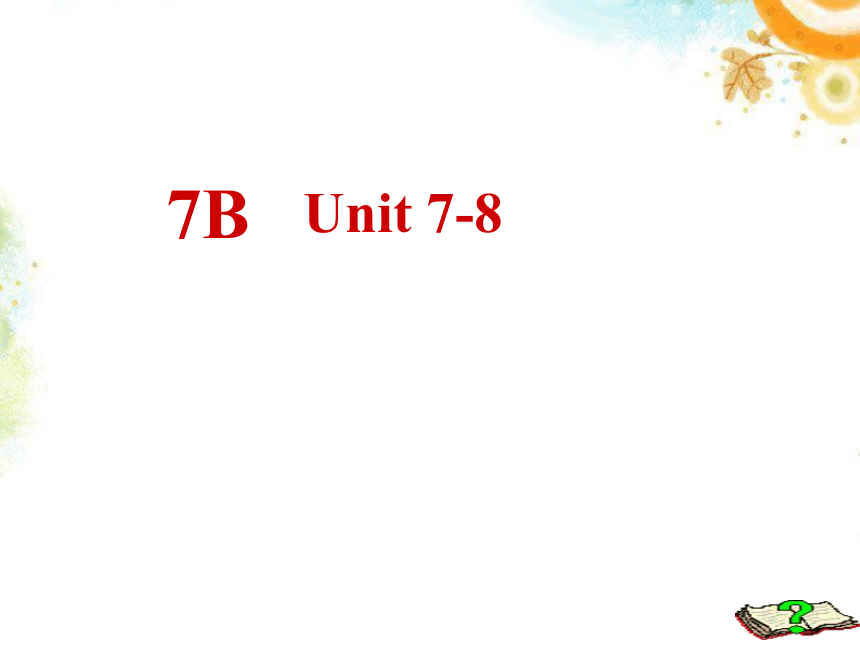 | |
| 格式 | pptx | ||
| 文件大小 | 163.4KB | ||
| 资源类型 | 教案 | ||
| 版本资源 | 牛津译林版 | ||
| 科目 | 英语 | ||
| 更新时间 | 2022-05-05 14:31:04 | ||
图片预览


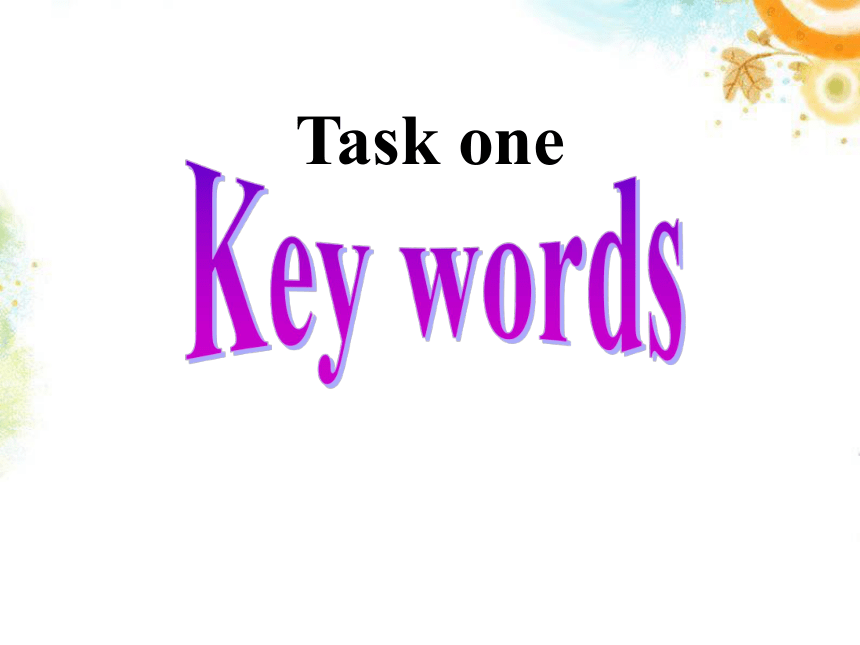

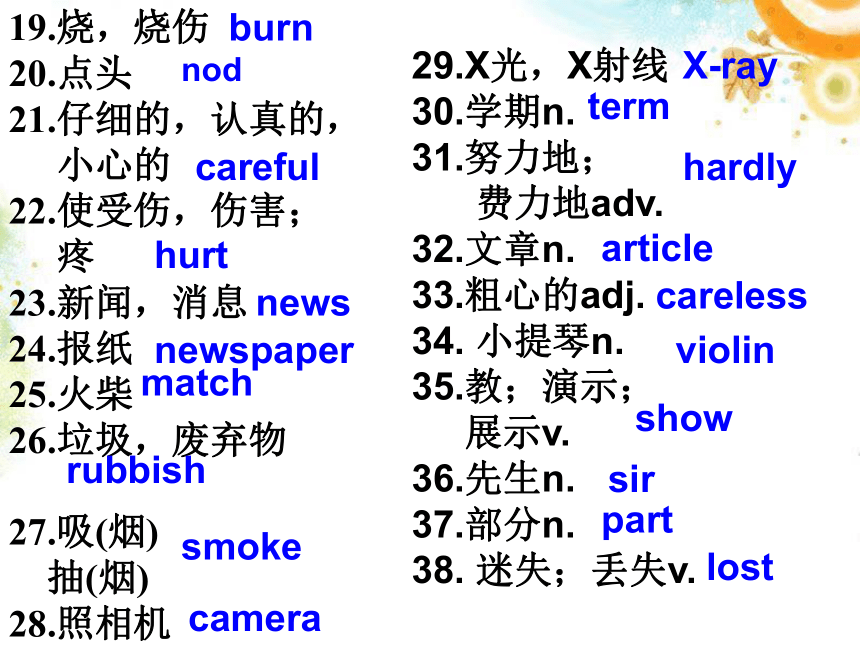
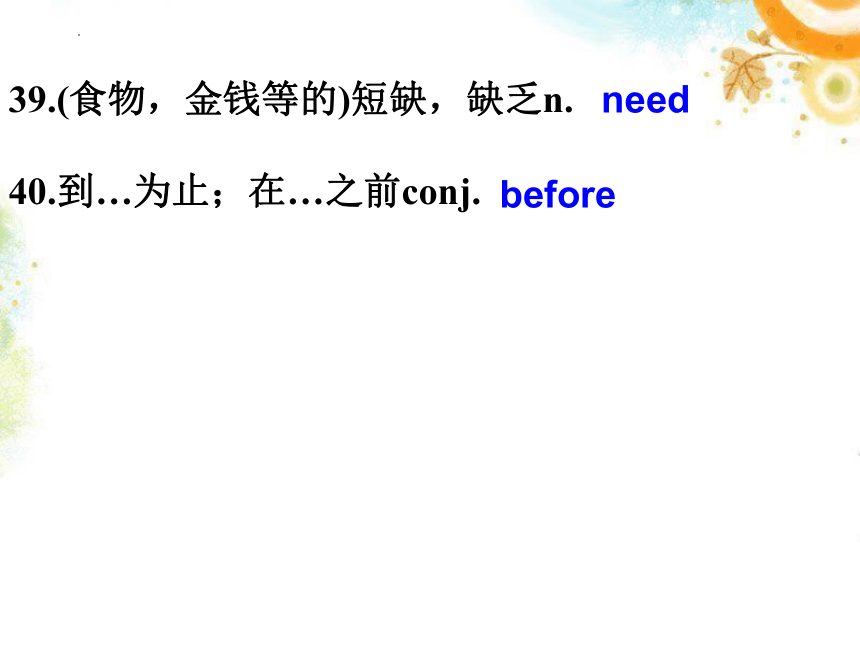
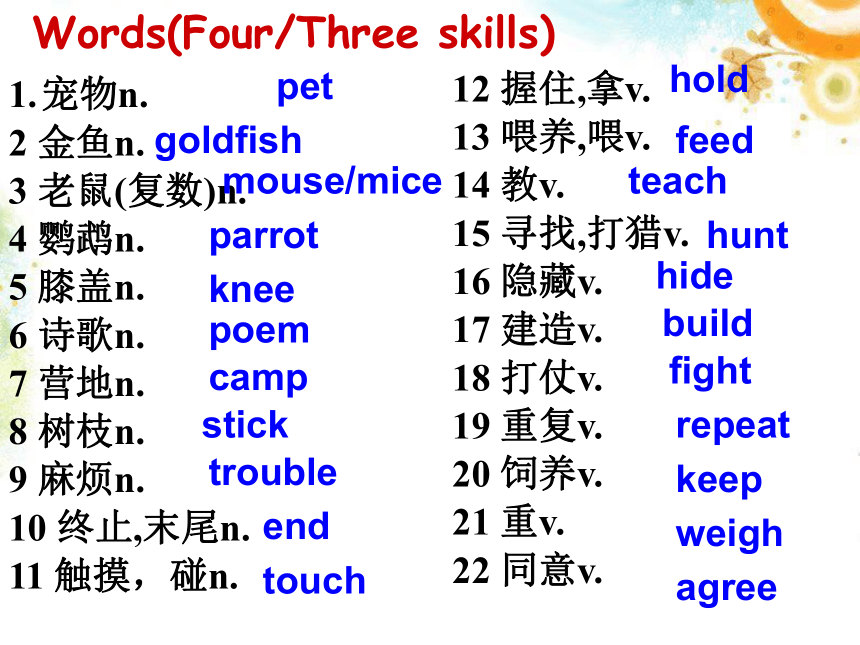
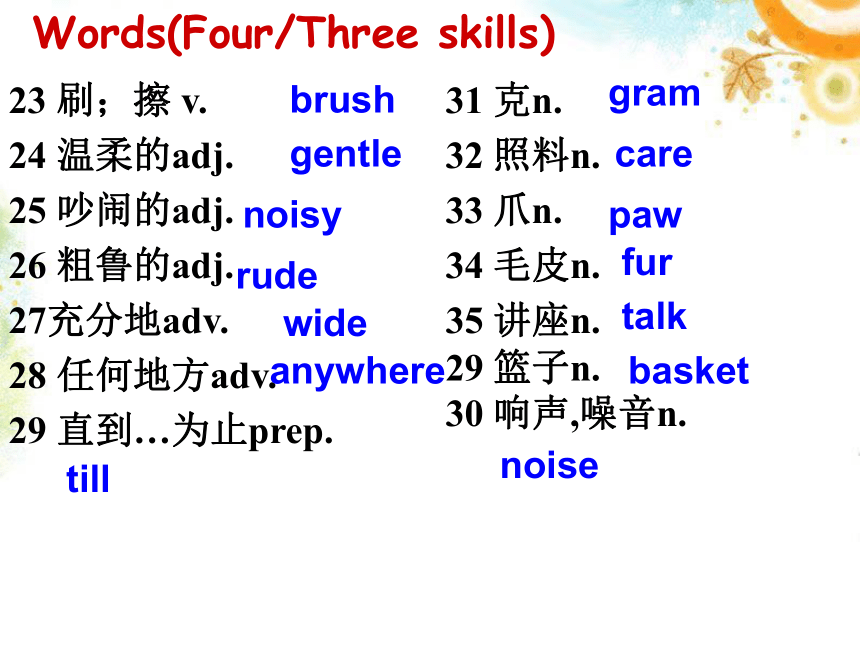
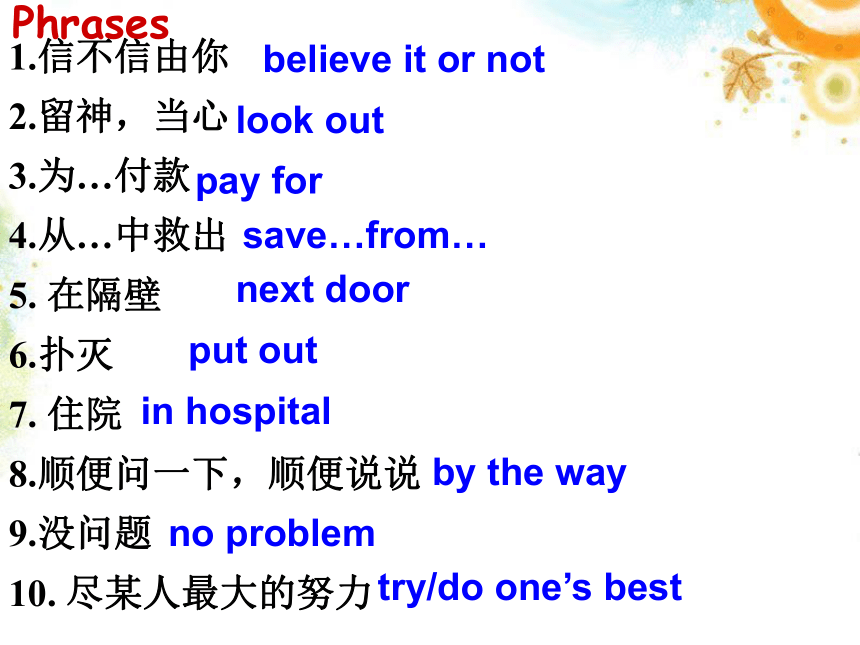
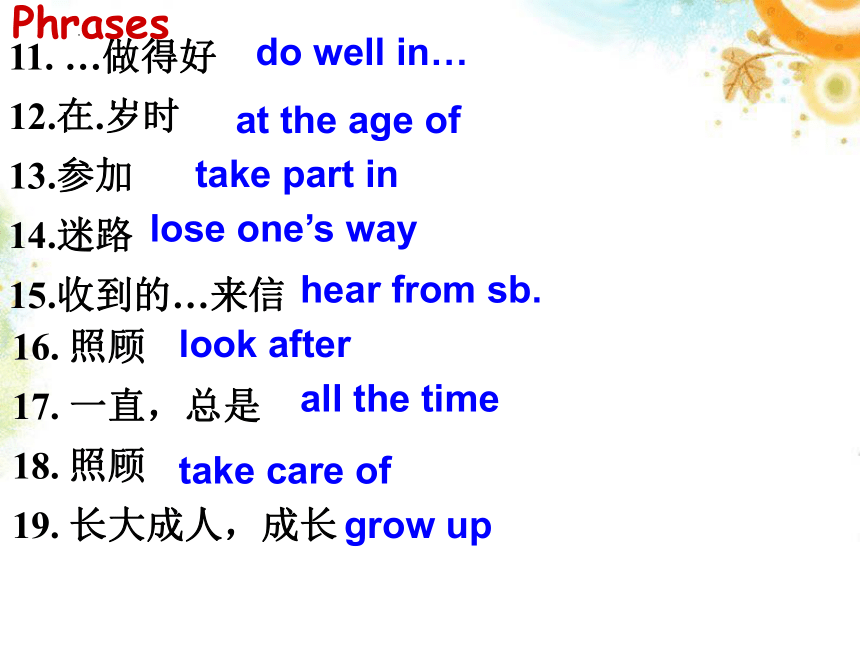
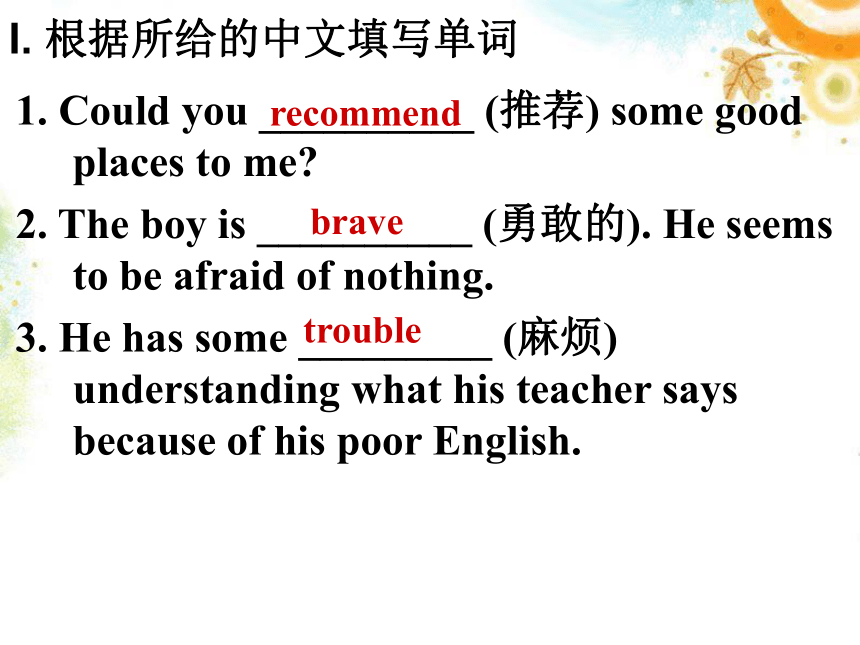
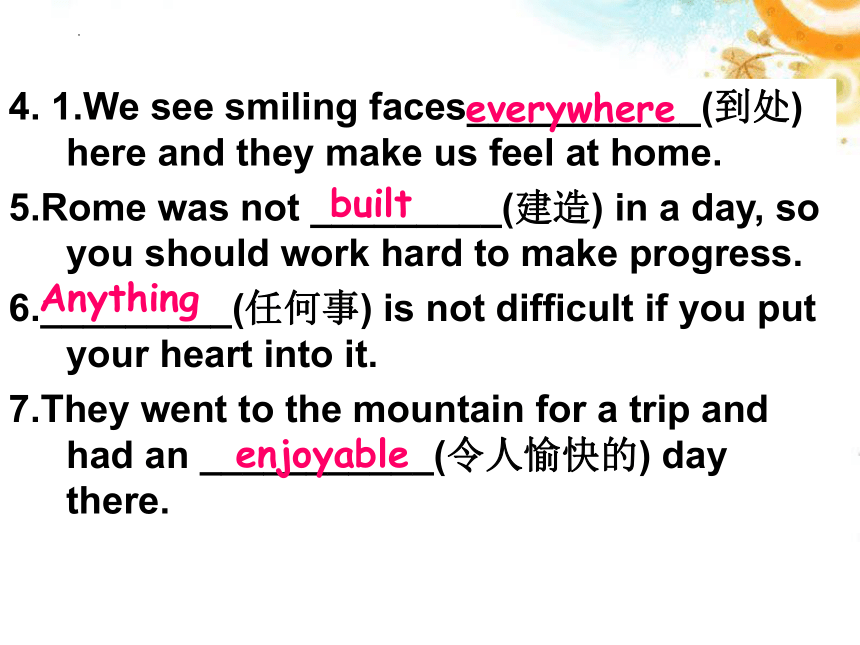
文档简介
(共44张PPT)
Unit 7-8
7B
复习目标
1.复习四会单词;
2.复习重点词组;
3.复习重点句型;
4.复习单元语法。
Task one
Key words
Words
1.能力n.
2.相信v.
3.座位n.
4.发送;邮寄v.
5.甚至adv.
6. 能,能够adj.
7. 付费v.
8.笔记本n.
9.募集v.
10.勇敢的adj.
11.救助,救v.
12.烟,烟雾n.
13.严重地,
厉害地adv.
14.受伤的adj.
15.可以,能
16.保护v.
17. 冲,奔v.
18. 湿的,未干的
有雨adj.
save
smoke
badly
hurt
could
protect
ability
believe
seat
send
even
able
pay/paid
notebook
raise
brave
rush
wet
29.X光,X射线
30.学期n.
31.努力地;
费力地adv.
32.文章n.
33.粗心的adj.
34. 小提琴n.
35.教;演示;
展示v.
36.先生n.
37.部分n.
38. 迷失;丢失v.
19.烧,烧伤
20.点头
21.仔细的,认真的,
小心的
22.使受伤,伤害;
疼
23.新闻,消息
24.报纸
25.火柴
26.垃圾,废弃物
27.吸(烟)
抽(烟)
28.照相机
burn
nod
careful
hurt
news
newspaper
match
rubbish
smoke
X-ray
term
hardly
camera
article
careless
violin
show
sir
part
lost
39.(食物,金钱等的)短缺,缺乏n.
40.到…为止;在…之前conj.
need
before
12 握住,拿v.
13 喂养,喂v.
14 教v.
15 寻找,打猎v.
16 隐藏v.
17 建造v.
18 打仗v.
19 重复v.
20 饲养v.
21 重v.
22 同意v.
宠物n.
2 金鱼n.
3 老鼠(复数)n.
4 鹦鹉n.
5 膝盖n.
6 诗歌n.
7 营地n.
8 树枝n.
9 麻烦n.
10 终止,末尾n.
11 触摸,碰n.
Words(Four/Three skills)
pet
goldfish
mouse/mice
parrot
knee
poem
camp
stick
trouble
end
touch
hold
feed
teach
hunt
hide
build
fight
repeat
keep
agree
weigh
31 克n.
32 照料n.
33 爪n.
34 毛皮n.
35 讲座n.
29 篮子n.
30 响声,噪音n.
23 刷;擦 v.
24 温柔的adj.
25 吵闹的adj.
26 粗鲁的adj.
27充分地adv.
28 任何地方adv.
29 直到…为止prep.
Words(Four/Three skills)
brush
gentle
noisy
rude
wide
anywhere
till
gram
care
paw
fur
talk
basket
noise
1.信不信由你
2.留神,当心
3.为…付款
4.从…中救出
5. 在隔壁
6.扑灭
7. 住院
8.顺便问一下,顺便说说
9.没问题
10. 尽某人最大的努力
Phrases
believe it or not
look out
pay for
save…from…
next door
put out
in hospital
by the way
no problem
try/do one’s best
11. …做得好
12.在.岁时
13.参加
14.迷路
15.收到的…来信
Phrases
do well in…
at the age of
take part in
lose one’s way
hear from sb.
16. 照顾
17. 一直,总是
18. 照顾
19. 长大成人,成长
look after
all the time
take care of
grow up
I. 根据所给的中文填写单词
1. Could you __________ (推荐) some good places to me
2. The boy is __________ (勇敢的). He seems to be afraid of nothing.
3. He has some _________ (麻烦) understanding what his teacher says because of his poor English.
recommend
brave
trouble
4. 1.We see smiling faces___________(到处) here and they make us feel at home.
5.Rome was not _________(建造) in a day, so you should work hard to make progress.
6._________(任何事) is not difficult if you put your heart into it.
7.They went to the mountain for a trip and had an ___________(令人愉快的) day there.
everywhere
built
Anything
enjoyable
II.根据所给单词的适当形式填写单词
1. Tom watched the children __________ (play) football yesterday.
2. How ________ (care) you are! You’ve knocked the cup off the table again!
3. My grandfather has stopped _________ (smoke) because the doctor told him to do so.
play
careless
smoking
4.When spring comes, we may feel _________(sleep), especially in the afternoon.
5.Yangzhou, a green city, is a _________(please) place for people to live in.
sleepy
pleasant
单词辨析
1. ability / able / can
(1)He has the __________ to finish the job alone.
(2)He was __________ to swim at the age of 4.
(3)He __________ ride a bike when he was 12.
ability
able
could
2. raise…for / donate…to; raise / rise
(1)It’s meaningful to __________ money for children in poor areas.
(2)It’s kind of him to __________ his pocket money to the disabled.
(3)You can __________ your hand, if you have any question.
(4)The sun __________ in the east.
(5)Many tourists like watching the __________ of the national flag.
raise
donate
raise
rises
raising
3. careful / care / careless / carefully / carelessly
Be careful! = Look out! = Take care!
be careful (not) to do sth, be careful with sth
take care of = care for = look after
(1)Be __________ not to make the same mistake next time.
(2)He is __________ enough to __________ for the old.
(3)He did all his homework so ________ that his teacher was unhappy with him.
(4)Millie is such a __________ girl that she always leaves things at home.
care
careful
careful
carelessly
careless
4. hold(v.) –held 握住,拿;容纳;支撑;举行 hold on==wait a moment,
(1) He _________ a gun in his hand and broke into the bank.
(2) Our school hall _________ 1,5000 people. We often have meetings and parties there.
(3) Are you sure that branch will be strong enough to ________you
(4) The fashion show________(hold) unless it rains next Saturday.
held
holds
will be held
hold
5. teach(v.)—taught teach sth. teach sb. sth, teach sb. to do sth, teach oneself
---Who ___________ (teach) you Physics
(2) (2014.常州) I can still speak some French now, for I _________(teach) Chinese in France for several years.
(3) As an excellent teacher, she devoted most of her time to __________(teach) her students.
(4) He is__________________________Wechat.
(5) She came to China in 1995, and _____________(teach) English in China since then.
teaches
taught
teaching
teaching his parents how to use
has taught
6. wide (adj&adv.)/ widely (adv.) open one’s eyes/ mouth wide; be widely used
(1)This is a ________________(10米宽) bridge.
(2) (2014.泰州) The CD can help you know _________(wide) the knowledge of geography.
(3) (2014.无锡) The shop owner suddenly stopped talking with his mouth_________ like a big “O”. It was the President!
A. tight closed B. tightly closed C. wide open D. widely open
10-meter-wide
widely
C
7. fight (v&n.) ---fought
fight with sb. about sth; fight for sth; fight against sth.
(1)It’s not worth__________(fight) about money.
(2) I had a __________(fight) with my mum over when I had to be home.
(3) The workers ____________(fight) for their rights for several days.
fighting
fight
have fought
8. end(n.)
(1) My house is ___________________(在这条街的尽头).
(2) I’m going on holiday _______________________(在十月底).
(3)_____________(最后)==At last, he decided to give in.
(4) I will look after you _______________(直到最后).
(5) Our plane was delayed for hours and the wait seemed__________(end).
at the end of the road
at the end of October
In the end
until the end
endless
9. till/ until till是介词,其主句的动词是持续性动词;
until可置于句首,其主句的动词是瞬间性动词,只用not…until…结构
(1)________ the end of the film, you won’t find out the murderer .
(2) He sleeps _________ seven o’clock every day.
(3) We won't leave _________ the police get here.
Until
till/until
until
10. trouble(v&n.)
be in trouble;
have trouble (in) doing sth.,
have trouble with sth.
get into trouble,
so much trouble
(1) I’m having trouble _________(get) the car started.
(2) Sorry _________(trouble) you, but would you mind answering a few questions
getting
to trouble
11. weigh(v.) weight(n.)
(1) What’s her__________ == How much does she__________ == How___________ is she
(2) She is__________________ me.=== She is as________________me.(和我一样重)
weight
weigh
heavy
the same weight as
heavy as me
Task 2
Key phrases
1.信不信由你
2.当心,小心
3.清理公园
4.把某物寄/送给某人
5.能做某事
6.迷路
7.一个8岁的男孩
8.伤得严重
9.把水倒到他的衣服上来保护他自己
believe it or not
look out=be careful
clean up the park
send sth to sb=send sb sth
be able to do sth
lose one's way=get lost
an 8-year-old boy
be badly hurt
pour water over his clothes to protect himself
10.冲进厨房
11.用湿毛毯裹在孙夫人身上
12.就在那时
13.在(做)某事方面做得更好
14.叫救命
15.玩火柴
16.在…方面努力训练
17.弹钢琴/拉小提琴
18.使某人远离
19.把某物落在家
rush into the kitchen
put a wet blanket over Mrs Sun
at that moment =just then
do better in sth/ doing sth
call for help
play with matches
practise hard on…
play the piano/violin
keep sb away from sth
leave sth at home
20.在你的手机上拨个电话
21.制造麻烦
22.努力学习地理
23.发出动听的声音
24.喂她胡萝卜
25.重达四十克
26.用树枝搭建帐篷
27.制造些/许多噪音
28.吵闹
make a call on your mobile
make trouble
work hard on/at Geography
make nice sounds
feed her carrots/feed carrots to her
weigh up to 40 grams
build camps out of sticks
make some/much noise
be noisy
Task 3
Important sentences
1. He was brave enough to save his neighbour from a fire.
adj.+enough+to do sth. enough+n.
(1)房子足够大,能够我们四个人住。
The house is ___________________________________.
(2)他跑得足够快能赶上公共汽车。
He runs ___________________________________.
big enough to hold four of us
fast enough to catch the bus
2. Suddenly, he heard someone shouting “Fire! Fire! Help!”
hear sb. do sth; hear sb. doing sth;
sb. be heard to do sth;
sb. be heard doing sth
(1)我经常听到他在教室里唱歌。
I often __________________________________________
(2)你听到有人在敲门吗?
Do you hear _________________________________________
hear him sing in the classroom
someone knocking at the door
(3)He was seen __________ (run) down the street at 10 p.m. last night.
(4)They were often seen __________ (take) a walk in the park after dinner.
(5) Did you see an old man _________(walk) into that shop
(6) Who did you watch __________(break) into the office at 4 p.m. yesterday
running
to take
breaking
walk
3. He went in and found his neighbour, the 79-year-old Mrs Sun, in the kitchen.
(1)一篇800字的文章
(2)一座11米宽的桥
an 800-word article
an 11-metre-wide bridge
4. but I didn’t have time to think about it.
think about 意为“考虑”,about 为介词后接n.或ving.
(1)你在考虑去湖南度假吗?
Are you thinking about _____________________________________.
(2)我们必须考虑这件事。
We must___________________________.
going to Hunan for a holiday
think about it
think of意为“考虑,想起”
(1)你认为这部电影咋样?
What do you _________________________
(2)对不起我想不起你的名字?
I’m sorry _________________________.
think of this film
I can’t think of your name
5. We look forward to hearing from you soon.
我们正期待着一个没有作业的假期。
(1)We are looking forward to _________________________________.
(2)We look forward to __________ (meet) you again.
meeting
a holiday without holiday
6. He is happy all the time.
all the time==always== at all times,
at a time: 一次
at times==sometimes==from time to time,
( )Don’t try to do everything at once. Take it a bit_________.
A. at times B. at that time
C. at all times D. at a time
7. Put your goldfish in the sun. in the sun: 在阳光下 under the sun: 天下,全世界
(1)Don’t read ______________.
(2)We talked about everything _____________.
A
in the sun
under the sun
Task 4
Grammar land
1.can,could 与may
(1)can 常用于口语中,表示非正式的请求,请求对象一般是家人或朋友。
杰克,我能用一下你的钢笔吗?_______________________,Jack
表示惊异,不相信等态度(主要用于否定句和疑问句中)用 can’t,表示“不可能”
王先生不可能在家。他现在在国外。
Mr.Wang ______at home. He is abroad now.
爸爸,我能休息一下吗?____________________,Dad
Can I use your pen
can't be
Can I have a rest
(2)______是_______的过去式。在口语中,could常代替can被用来表示向对方委婉地提出请求或发表看法,比can正式。这时could不表示过去时态,回答一般用can。
----我能用一下你的手机吗?----好的,可以的。给你。
----_________I use your mobile phone ------Yes, you______.Here you are.
(3)may 较正式。表示许可或征求对方的许可,有“可以”的意思
我可以用你的电脑吗?________I use your computer
could
can
Could
can
May
2.感叹句
(1)what 引导的感叹句结构
▲What+______+形容词+可数名词单数+主语+谓语
他是一个多么聪明的男孩啊!_______________he is!
▲What+形容词+不可数名词+主语+谓语! 今天天气真好啊!________________it is today!
注意:常见的不可数名词有weather/fun/information/music/news/work/progress
▲What+形容词+复数名词+主语+谓语!这些花真美啊!_____________________they are!
(2)how 引导的感叹句结构 ______+形容词/副词+主语+谓语
这个男孩真聪明啊!_____________the boy is !
a/an
What a clever boy
What fine weather
What beautiful flowers
How clever
How
【过中考】
1.( )________bad today!It is raining hard. We have to stay at home.
A.How a B.What a C.How D.What
3.形容词 我们常用形容词来描述人或物。
(1)形容词可以放在名词前作定语。她头发很长,腿很短。She has ________and ________.
(2)形容词也可以放在系动词后作表语。今天他很开心。He _____________today.
注意:除_______动词外,系动词还包括become,feel,get,look,seem,smell,sound,turn等。这些单词后面可接形容词作表语。
秋天树叶变棕色。Leaves _____________in autumn.
turn brown
B
be
long hair
short legs
is very happy
4.不定代词 我们常用不定代词指代某个不特定的人或物。
▲不定代词_________常用于肯定句。
门口有个人。There is___________at the door.
▲不定代词_________常用于否定句或疑问句。
我谁也没看见。I didn’t see__________.
▲不定代词no-有否定含义。
盒子里什么都没有。There is ________in the box.
▲不定代词every-可以用于各种句式。 一切都准备好了。___________is ready.
▲不定代词everybody/everyone/everything 一般都被视作单数,谓语动词用单数。
some-
nothing
any-
somebody/someone
anyone/anybody
Everything
Unit 7-8
7B
复习目标
1.复习四会单词;
2.复习重点词组;
3.复习重点句型;
4.复习单元语法。
Task one
Key words
Words
1.能力n.
2.相信v.
3.座位n.
4.发送;邮寄v.
5.甚至adv.
6. 能,能够adj.
7. 付费v.
8.笔记本n.
9.募集v.
10.勇敢的adj.
11.救助,救v.
12.烟,烟雾n.
13.严重地,
厉害地adv.
14.受伤的adj.
15.可以,能
16.保护v.
17. 冲,奔v.
18. 湿的,未干的
有雨adj.
save
smoke
badly
hurt
could
protect
ability
believe
seat
send
even
able
pay/paid
notebook
raise
brave
rush
wet
29.X光,X射线
30.学期n.
31.努力地;
费力地adv.
32.文章n.
33.粗心的adj.
34. 小提琴n.
35.教;演示;
展示v.
36.先生n.
37.部分n.
38. 迷失;丢失v.
19.烧,烧伤
20.点头
21.仔细的,认真的,
小心的
22.使受伤,伤害;
疼
23.新闻,消息
24.报纸
25.火柴
26.垃圾,废弃物
27.吸(烟)
抽(烟)
28.照相机
burn
nod
careful
hurt
news
newspaper
match
rubbish
smoke
X-ray
term
hardly
camera
article
careless
violin
show
sir
part
lost
39.(食物,金钱等的)短缺,缺乏n.
40.到…为止;在…之前conj.
need
before
12 握住,拿v.
13 喂养,喂v.
14 教v.
15 寻找,打猎v.
16 隐藏v.
17 建造v.
18 打仗v.
19 重复v.
20 饲养v.
21 重v.
22 同意v.
宠物n.
2 金鱼n.
3 老鼠(复数)n.
4 鹦鹉n.
5 膝盖n.
6 诗歌n.
7 营地n.
8 树枝n.
9 麻烦n.
10 终止,末尾n.
11 触摸,碰n.
Words(Four/Three skills)
pet
goldfish
mouse/mice
parrot
knee
poem
camp
stick
trouble
end
touch
hold
feed
teach
hunt
hide
build
fight
repeat
keep
agree
weigh
31 克n.
32 照料n.
33 爪n.
34 毛皮n.
35 讲座n.
29 篮子n.
30 响声,噪音n.
23 刷;擦 v.
24 温柔的adj.
25 吵闹的adj.
26 粗鲁的adj.
27充分地adv.
28 任何地方adv.
29 直到…为止prep.
Words(Four/Three skills)
brush
gentle
noisy
rude
wide
anywhere
till
gram
care
paw
fur
talk
basket
noise
1.信不信由你
2.留神,当心
3.为…付款
4.从…中救出
5. 在隔壁
6.扑灭
7. 住院
8.顺便问一下,顺便说说
9.没问题
10. 尽某人最大的努力
Phrases
believe it or not
look out
pay for
save…from…
next door
put out
in hospital
by the way
no problem
try/do one’s best
11. …做得好
12.在.岁时
13.参加
14.迷路
15.收到的…来信
Phrases
do well in…
at the age of
take part in
lose one’s way
hear from sb.
16. 照顾
17. 一直,总是
18. 照顾
19. 长大成人,成长
look after
all the time
take care of
grow up
I. 根据所给的中文填写单词
1. Could you __________ (推荐) some good places to me
2. The boy is __________ (勇敢的). He seems to be afraid of nothing.
3. He has some _________ (麻烦) understanding what his teacher says because of his poor English.
recommend
brave
trouble
4. 1.We see smiling faces___________(到处) here and they make us feel at home.
5.Rome was not _________(建造) in a day, so you should work hard to make progress.
6._________(任何事) is not difficult if you put your heart into it.
7.They went to the mountain for a trip and had an ___________(令人愉快的) day there.
everywhere
built
Anything
enjoyable
II.根据所给单词的适当形式填写单词
1. Tom watched the children __________ (play) football yesterday.
2. How ________ (care) you are! You’ve knocked the cup off the table again!
3. My grandfather has stopped _________ (smoke) because the doctor told him to do so.
play
careless
smoking
4.When spring comes, we may feel _________(sleep), especially in the afternoon.
5.Yangzhou, a green city, is a _________(please) place for people to live in.
sleepy
pleasant
单词辨析
1. ability / able / can
(1)He has the __________ to finish the job alone.
(2)He was __________ to swim at the age of 4.
(3)He __________ ride a bike when he was 12.
ability
able
could
2. raise…for / donate…to; raise / rise
(1)It’s meaningful to __________ money for children in poor areas.
(2)It’s kind of him to __________ his pocket money to the disabled.
(3)You can __________ your hand, if you have any question.
(4)The sun __________ in the east.
(5)Many tourists like watching the __________ of the national flag.
raise
donate
raise
rises
raising
3. careful / care / careless / carefully / carelessly
Be careful! = Look out! = Take care!
be careful (not) to do sth, be careful with sth
take care of = care for = look after
(1)Be __________ not to make the same mistake next time.
(2)He is __________ enough to __________ for the old.
(3)He did all his homework so ________ that his teacher was unhappy with him.
(4)Millie is such a __________ girl that she always leaves things at home.
care
careful
careful
carelessly
careless
4. hold(v.) –held 握住,拿;容纳;支撑;举行 hold on==wait a moment,
(1) He _________ a gun in his hand and broke into the bank.
(2) Our school hall _________ 1,5000 people. We often have meetings and parties there.
(3) Are you sure that branch will be strong enough to ________you
(4) The fashion show________(hold) unless it rains next Saturday.
held
holds
will be held
hold
5. teach(v.)—taught teach sth. teach sb. sth, teach sb. to do sth, teach oneself
---Who ___________ (teach) you Physics
(2) (2014.常州) I can still speak some French now, for I _________(teach) Chinese in France for several years.
(3) As an excellent teacher, she devoted most of her time to __________(teach) her students.
(4) He is__________________________Wechat.
(5) She came to China in 1995, and _____________(teach) English in China since then.
teaches
taught
teaching
teaching his parents how to use
has taught
6. wide (adj&adv.)/ widely (adv.) open one’s eyes/ mouth wide; be widely used
(1)This is a ________________(10米宽) bridge.
(2) (2014.泰州) The CD can help you know _________(wide) the knowledge of geography.
(3) (2014.无锡) The shop owner suddenly stopped talking with his mouth_________ like a big “O”. It was the President!
A. tight closed B. tightly closed C. wide open D. widely open
10-meter-wide
widely
C
7. fight (v&n.) ---fought
fight with sb. about sth; fight for sth; fight against sth.
(1)It’s not worth__________(fight) about money.
(2) I had a __________(fight) with my mum over when I had to be home.
(3) The workers ____________(fight) for their rights for several days.
fighting
fight
have fought
8. end(n.)
(1) My house is ___________________(在这条街的尽头).
(2) I’m going on holiday _______________________(在十月底).
(3)_____________(最后)==At last, he decided to give in.
(4) I will look after you _______________(直到最后).
(5) Our plane was delayed for hours and the wait seemed__________(end).
at the end of the road
at the end of October
In the end
until the end
endless
9. till/ until till是介词,其主句的动词是持续性动词;
until可置于句首,其主句的动词是瞬间性动词,只用not…until…结构
(1)________ the end of the film, you won’t find out the murderer .
(2) He sleeps _________ seven o’clock every day.
(3) We won't leave _________ the police get here.
Until
till/until
until
10. trouble(v&n.)
be in trouble;
have trouble (in) doing sth.,
have trouble with sth.
get into trouble,
so much trouble
(1) I’m having trouble _________(get) the car started.
(2) Sorry _________(trouble) you, but would you mind answering a few questions
getting
to trouble
11. weigh(v.) weight(n.)
(1) What’s her__________ == How much does she__________ == How___________ is she
(2) She is__________________ me.=== She is as________________me.(和我一样重)
weight
weigh
heavy
the same weight as
heavy as me
Task 2
Key phrases
1.信不信由你
2.当心,小心
3.清理公园
4.把某物寄/送给某人
5.能做某事
6.迷路
7.一个8岁的男孩
8.伤得严重
9.把水倒到他的衣服上来保护他自己
believe it or not
look out=be careful
clean up the park
send sth to sb=send sb sth
be able to do sth
lose one's way=get lost
an 8-year-old boy
be badly hurt
pour water over his clothes to protect himself
10.冲进厨房
11.用湿毛毯裹在孙夫人身上
12.就在那时
13.在(做)某事方面做得更好
14.叫救命
15.玩火柴
16.在…方面努力训练
17.弹钢琴/拉小提琴
18.使某人远离
19.把某物落在家
rush into the kitchen
put a wet blanket over Mrs Sun
at that moment =just then
do better in sth/ doing sth
call for help
play with matches
practise hard on…
play the piano/violin
keep sb away from sth
leave sth at home
20.在你的手机上拨个电话
21.制造麻烦
22.努力学习地理
23.发出动听的声音
24.喂她胡萝卜
25.重达四十克
26.用树枝搭建帐篷
27.制造些/许多噪音
28.吵闹
make a call on your mobile
make trouble
work hard on/at Geography
make nice sounds
feed her carrots/feed carrots to her
weigh up to 40 grams
build camps out of sticks
make some/much noise
be noisy
Task 3
Important sentences
1. He was brave enough to save his neighbour from a fire.
adj.+enough+to do sth. enough+n.
(1)房子足够大,能够我们四个人住。
The house is ___________________________________.
(2)他跑得足够快能赶上公共汽车。
He runs ___________________________________.
big enough to hold four of us
fast enough to catch the bus
2. Suddenly, he heard someone shouting “Fire! Fire! Help!”
hear sb. do sth; hear sb. doing sth;
sb. be heard to do sth;
sb. be heard doing sth
(1)我经常听到他在教室里唱歌。
I often __________________________________________
(2)你听到有人在敲门吗?
Do you hear _________________________________________
hear him sing in the classroom
someone knocking at the door
(3)He was seen __________ (run) down the street at 10 p.m. last night.
(4)They were often seen __________ (take) a walk in the park after dinner.
(5) Did you see an old man _________(walk) into that shop
(6) Who did you watch __________(break) into the office at 4 p.m. yesterday
running
to take
breaking
walk
3. He went in and found his neighbour, the 79-year-old Mrs Sun, in the kitchen.
(1)一篇800字的文章
(2)一座11米宽的桥
an 800-word article
an 11-metre-wide bridge
4. but I didn’t have time to think about it.
think about 意为“考虑”,about 为介词后接n.或ving.
(1)你在考虑去湖南度假吗?
Are you thinking about _____________________________________.
(2)我们必须考虑这件事。
We must___________________________.
going to Hunan for a holiday
think about it
think of意为“考虑,想起”
(1)你认为这部电影咋样?
What do you _________________________
(2)对不起我想不起你的名字?
I’m sorry _________________________.
think of this film
I can’t think of your name
5. We look forward to hearing from you soon.
我们正期待着一个没有作业的假期。
(1)We are looking forward to _________________________________.
(2)We look forward to __________ (meet) you again.
meeting
a holiday without holiday
6. He is happy all the time.
all the time==always== at all times,
at a time: 一次
at times==sometimes==from time to time,
( )Don’t try to do everything at once. Take it a bit_________.
A. at times B. at that time
C. at all times D. at a time
7. Put your goldfish in the sun. in the sun: 在阳光下 under the sun: 天下,全世界
(1)Don’t read ______________.
(2)We talked about everything _____________.
A
in the sun
under the sun
Task 4
Grammar land
1.can,could 与may
(1)can 常用于口语中,表示非正式的请求,请求对象一般是家人或朋友。
杰克,我能用一下你的钢笔吗?_______________________,Jack
表示惊异,不相信等态度(主要用于否定句和疑问句中)用 can’t,表示“不可能”
王先生不可能在家。他现在在国外。
Mr.Wang ______at home. He is abroad now.
爸爸,我能休息一下吗?____________________,Dad
Can I use your pen
can't be
Can I have a rest
(2)______是_______的过去式。在口语中,could常代替can被用来表示向对方委婉地提出请求或发表看法,比can正式。这时could不表示过去时态,回答一般用can。
----我能用一下你的手机吗?----好的,可以的。给你。
----_________I use your mobile phone ------Yes, you______.Here you are.
(3)may 较正式。表示许可或征求对方的许可,有“可以”的意思
我可以用你的电脑吗?________I use your computer
could
can
Could
can
May
2.感叹句
(1)what 引导的感叹句结构
▲What+______+形容词+可数名词单数+主语+谓语
他是一个多么聪明的男孩啊!_______________he is!
▲What+形容词+不可数名词+主语+谓语! 今天天气真好啊!________________it is today!
注意:常见的不可数名词有weather/fun/information/music/news/work/progress
▲What+形容词+复数名词+主语+谓语!这些花真美啊!_____________________they are!
(2)how 引导的感叹句结构 ______+形容词/副词+主语+谓语
这个男孩真聪明啊!_____________the boy is !
a/an
What a clever boy
What fine weather
What beautiful flowers
How clever
How
【过中考】
1.( )________bad today!It is raining hard. We have to stay at home.
A.How a B.What a C.How D.What
3.形容词 我们常用形容词来描述人或物。
(1)形容词可以放在名词前作定语。她头发很长,腿很短。She has ________and ________.
(2)形容词也可以放在系动词后作表语。今天他很开心。He _____________today.
注意:除_______动词外,系动词还包括become,feel,get,look,seem,smell,sound,turn等。这些单词后面可接形容词作表语。
秋天树叶变棕色。Leaves _____________in autumn.
turn brown
B
be
long hair
short legs
is very happy
4.不定代词 我们常用不定代词指代某个不特定的人或物。
▲不定代词_________常用于肯定句。
门口有个人。There is___________at the door.
▲不定代词_________常用于否定句或疑问句。
我谁也没看见。I didn’t see__________.
▲不定代词no-有否定含义。
盒子里什么都没有。There is ________in the box.
▲不定代词every-可以用于各种句式。 一切都准备好了。___________is ready.
▲不定代词everybody/everyone/everything 一般都被视作单数,谓语动词用单数。
some-
nothing
any-
somebody/someone
anyone/anybody
Everything
